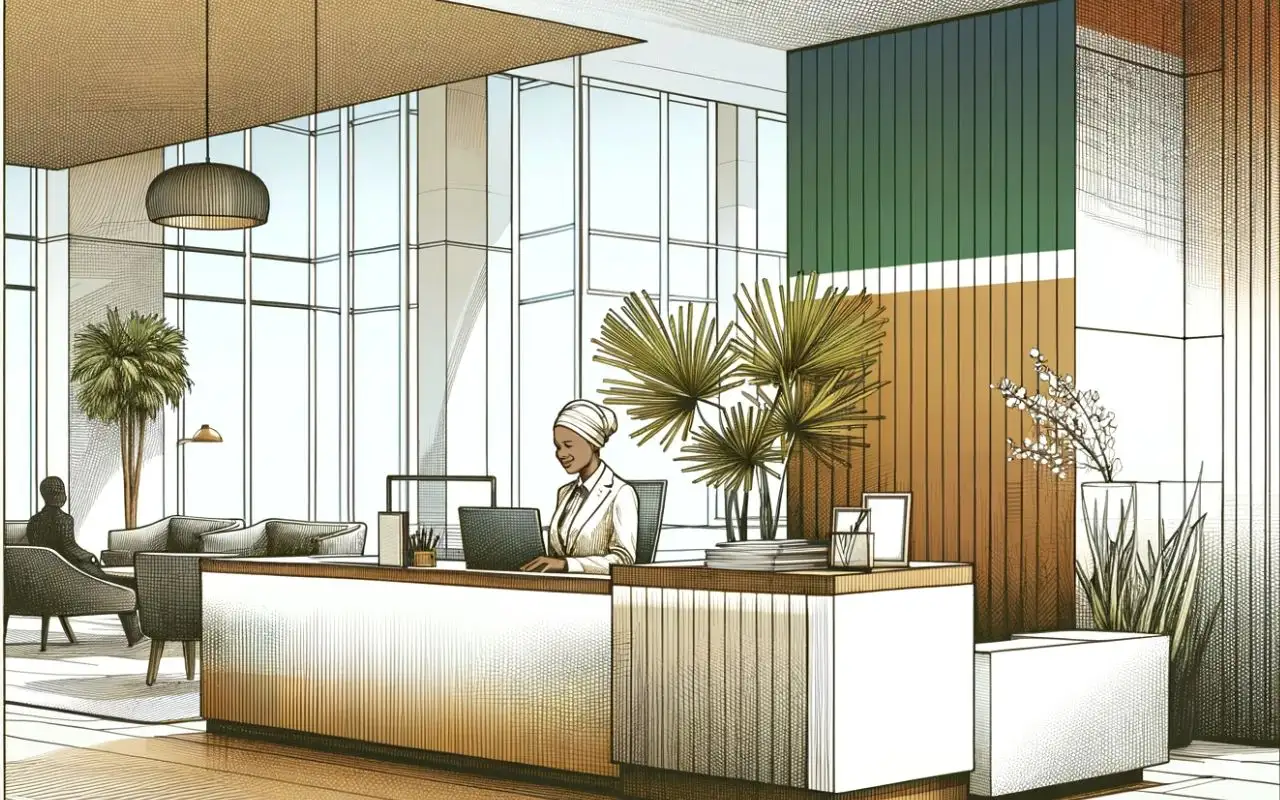A receptionist is a professional who manages the front desk or reception area of an organization, serving as the first point of contact for visitors and clients.
They play a crucial role in creating a welcoming environment, handling incoming calls, directing visitors, managing appointments, and providing general administrative support.
Receptionists are essential in maintaining effective communication between clients and employees, organizing mail, and sometimes handling basic inquiry responses.
Receptionists are found across various sectors, including healthcare, hospitality, corporate offices, and more, adapting their specific duties to the needs of their organization.
How Much Does A Receptionist Earn in South Africa
The average salary of a receptionist in South Africa is R10,000 monthly or R120,000 annually, which is 61% below the national average.
Entry-level positions start around R5,000 per month, while mid-career professionals earn approximately R8,600.
More experienced receptionists with 10-20 years can expect R10,000 monthly, and those with over 20 years might earn up to R12,000.
Salaries range from R4,000 to R13,000 monthly, depending on experience. Specializations also affect earnings; for instance, Medical Receptionists make around R116,000 annually, Dental Receptionists R112,000, and Front Desk Receptionists R110,000.
However, Hotel and Gym Receptionists tend to earn less, with yearly salaries of R94,000 and R73,000 respectively. The field is predominantly female, with women making up 78% of receptionists compared to 22% of males.
Factors Affecting Receptionist Salary in South Africa
Experience
Receptionists with more experience typically command higher salaries. Years of service and a proven track record in handling various tasks effectively are valued.
Education
While formal education isn’t always mandatory, higher levels of education, like diplomas or relevant certifications, can increase earning potential.
Industry and Company Size
Salaries vary depending on the industry and company size. Larger companies in bustling sectors like finance or technology often offer higher pay.
Location
Metropolitan areas like Johannesburg or Cape Town typically have higher living costs, reflected in higher receptionists’ salaries compared to smaller towns.
Specialization
Specialized receptionists, like medical or legal receptionists, often have more responsibility and require specific training, justifying higher salaries.
Language Skills
Multilingual receptionists, especially in diverse regions, are in higher demand and may earn more due to their ability to serve a wider clientele.
Additional Responsibilities
Receptionists taking on additional duties like administrative tasks, bookkeeping, or event coordination may see a salary increase.
Benefits
Some companies offer benefits packages with medical aid, pension contributions, or other perks, impacting the overall compensation.
Negotiation
Salary negotiation skills can play a significant role in securing a better offer, especially with relevant experience and qualifications.
Demand and Supply
In areas with high demand for receptionists and limited qualified candidates, salaries might be more competitive to attract talent.
Education and Qualifications of A Receptionist in South Africa
The education and qualifications required for a receptionist typically include a combination of formal education, specific skills training, and personal attributes.
Here’s a detailed breakdown:
1. Matriculation Certificate (Grade 12)
This is the minimum requirement for most receptionist positions. It demonstrates basic literacy, numeracy, and communication skills.
2. Office Administration Diploma/Certificate
These programs equip individuals with essential office skills like document management, communication, and bookkeeping, making them more competitive candidates.
3. Receptionist Diploma/Certificate
Specialized receptionist training covers industry-specific protocols, visitor management, switchboard operation, and professional etiquette, enhancing job prospects.
4. Computer Literacy
Strong proficiency in Microsoft Office suite (Word, Excel, PowerPoint) is essential for most receptionist roles, as they handle documents, spreadsheets, and presentations daily.
5. Customer Service Certification
Training in customer service principles and techniques equips receptionists to handle interactions effectively, build rapport with visitors, and resolve inquiries professionally.
6. First Aid Certification
In some workplaces, basic first aid training can be an advantage, allowing receptionists to respond to minor emergencies until medical help arrives.
7. Language Skills
Multilingualism is a valuable asset, especially in diverse regions, enabling communication with a broader clientele and potentially increasing earning potential.
8. Communication Skills
Excellent written and verbal communication are crucial for receptionists, as they interact with various stakeholders, relay information clearly, and draft professional emails.
9. Interpersonal Skills
Strong interpersonal skills are essential for building rapport, managing conflict, and fostering a positive first impression for the organization.
10. Problem-Solving Skills
The ability to identify, analyze, and solve problems effectively is beneficial, as receptionists often encounter unexpected situations and need to find solutions independently.
While a high school diploma might suffice for entry-level positions, additional qualifications and skills greatly enhance employability and effectiveness as a receptionist in South Africa.
The role is increasingly seen as one requiring a diverse skill set, combining administrative competence with excellent interpersonal abilities.

